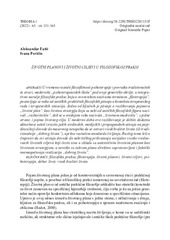Životni planovi i životni ciljevi u filozofskoj praksi
Life Plans and Life Goals in Philosophical Practice
Апстракт
Amid the ongoing and growing rise in the awareness of traditional schools of psychotherapy of the need for a more philosophical understanding of themselves and their clients, and the resulting return of the fragmented modern psychotherapy under the integrative aegis of philosophical practice (philotherapy), some of the ancient, practical philosophical issues have resurfaced with force in therapeutic practice. One is the issue of drawing an appropriate distinction between the concepts of life plan and life goals. The ancient philosophical figures tended to call the former „reason”, or „wisdom”. The modern age has re-actualized this distinction due to exceptionally forceful social and technological influences, many of which have caused large numbers of individuals to adopt life goals which, while socially highly desirable, in fact work against the implementation of their more authentic life plans. The outcome of this uncritical adoption of what seems as a thrilling and satisfying structu...re of life goals, while at the same time betraying one’s deeper life plan, or life strategy, is failure to achieve a high quality of life, or ‘the good life’.
Кључне речи:
philosophical practice / philotherapy / life plans / life goals / psychotherapy / the good life / high quality of lifeИзвор:
Theoria, 2022, 65, 1, 151-165Издавач:
- Beograd : Srpsko filozofsko društvo
Финансирање / пројекти:
- Министарство науке, технолошког развоја и иновација Републике Србије, институционално финансирање - 200025 (Универзитет у Београду, Институт за филозофију и друштвену теорију) (RS-MESTD-inst-2020-200025)
Колекције
Институција/група
IFDTTY - JOUR AU - Peričin, Ivana AU - Fatić, Aleksandar PY - 2022 UR - http://rifdt.instifdt.bg.ac.rs/123456789/2702 AB - Amid the ongoing and growing rise in the awareness of traditional schools of psychotherapy of the need for a more philosophical understanding of themselves and their clients, and the resulting return of the fragmented modern psychotherapy under the integrative aegis of philosophical practice (philotherapy), some of the ancient, practical philosophical issues have resurfaced with force in therapeutic practice. One is the issue of drawing an appropriate distinction between the concepts of life plan and life goals. The ancient philosophical figures tended to call the former „reason”, or „wisdom”. The modern age has re-actualized this distinction due to exceptionally forceful social and technological influences, many of which have caused large numbers of individuals to adopt life goals which, while socially highly desirable, in fact work against the implementation of their more authentic life plans. The outcome of this uncritical adoption of what seems as a thrilling and satisfying structure of life goals, while at the same time betraying one’s deeper life plan, or life strategy, is failure to achieve a high quality of life, or ‘the good life’. PB - Beograd : Srpsko filozofsko društvo T2 - Theoria T1 - Životni planovi i životni ciljevi u filozofskoj praksi T1 - Life Plans and Life Goals in Philosophical Practice IS - 1 VL - 65 SP - 151 EP - 165 DO - 10.2298/THEO2201151F ER -
@article{
author = "Peričin, Ivana and Fatić, Aleksandar",
year = "2022",
abstract = "Amid the ongoing and growing rise in the awareness of traditional schools of psychotherapy of the need for a more philosophical understanding of themselves and their clients, and the resulting return of the fragmented modern psychotherapy under the integrative aegis of philosophical practice (philotherapy), some of the ancient, practical philosophical issues have resurfaced with force in therapeutic practice. One is the issue of drawing an appropriate distinction between the concepts of life plan and life goals. The ancient philosophical figures tended to call the former „reason”, or „wisdom”. The modern age has re-actualized this distinction due to exceptionally forceful social and technological influences, many of which have caused large numbers of individuals to adopt life goals which, while socially highly desirable, in fact work against the implementation of their more authentic life plans. The outcome of this uncritical adoption of what seems as a thrilling and satisfying structure of life goals, while at the same time betraying one’s deeper life plan, or life strategy, is failure to achieve a high quality of life, or ‘the good life’.",
publisher = "Beograd : Srpsko filozofsko društvo",
journal = "Theoria",
title = "Životni planovi i životni ciljevi u filozofskoj praksi, Life Plans and Life Goals in Philosophical Practice",
number = "1",
volume = "65",
pages = "151-165",
doi = "10.2298/THEO2201151F"
}
Peričin, I.,& Fatić, A.. (2022). Životni planovi i životni ciljevi u filozofskoj praksi. in Theoria Beograd : Srpsko filozofsko društvo., 65(1), 151-165. https://doi.org/10.2298/THEO2201151F
Peričin I, Fatić A. Životni planovi i životni ciljevi u filozofskoj praksi. in Theoria. 2022;65(1):151-165. doi:10.2298/THEO2201151F .
Peričin, Ivana, Fatić, Aleksandar, "Životni planovi i životni ciljevi u filozofskoj praksi" in Theoria, 65, no. 1 (2022):151-165, https://doi.org/10.2298/THEO2201151F . .



